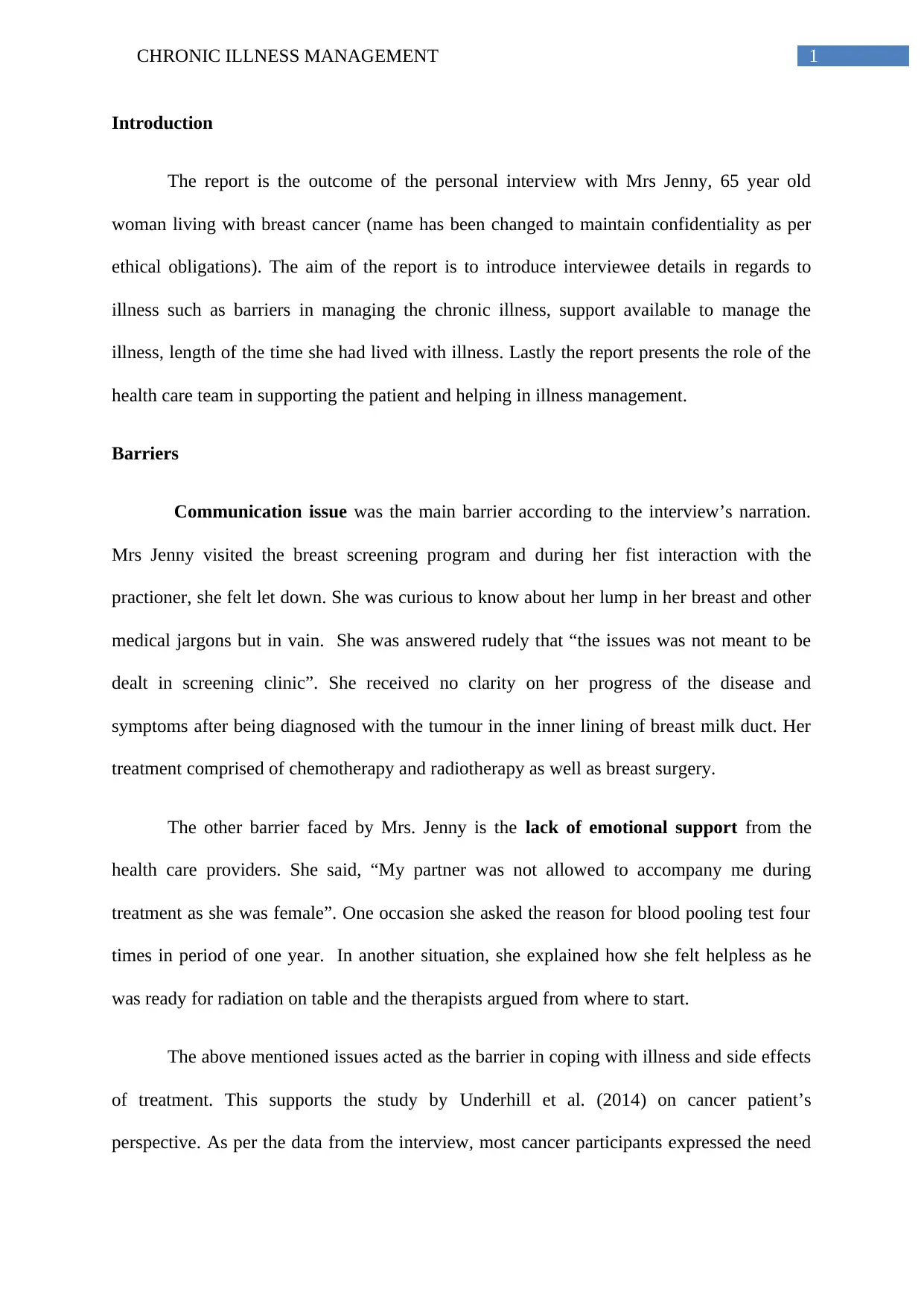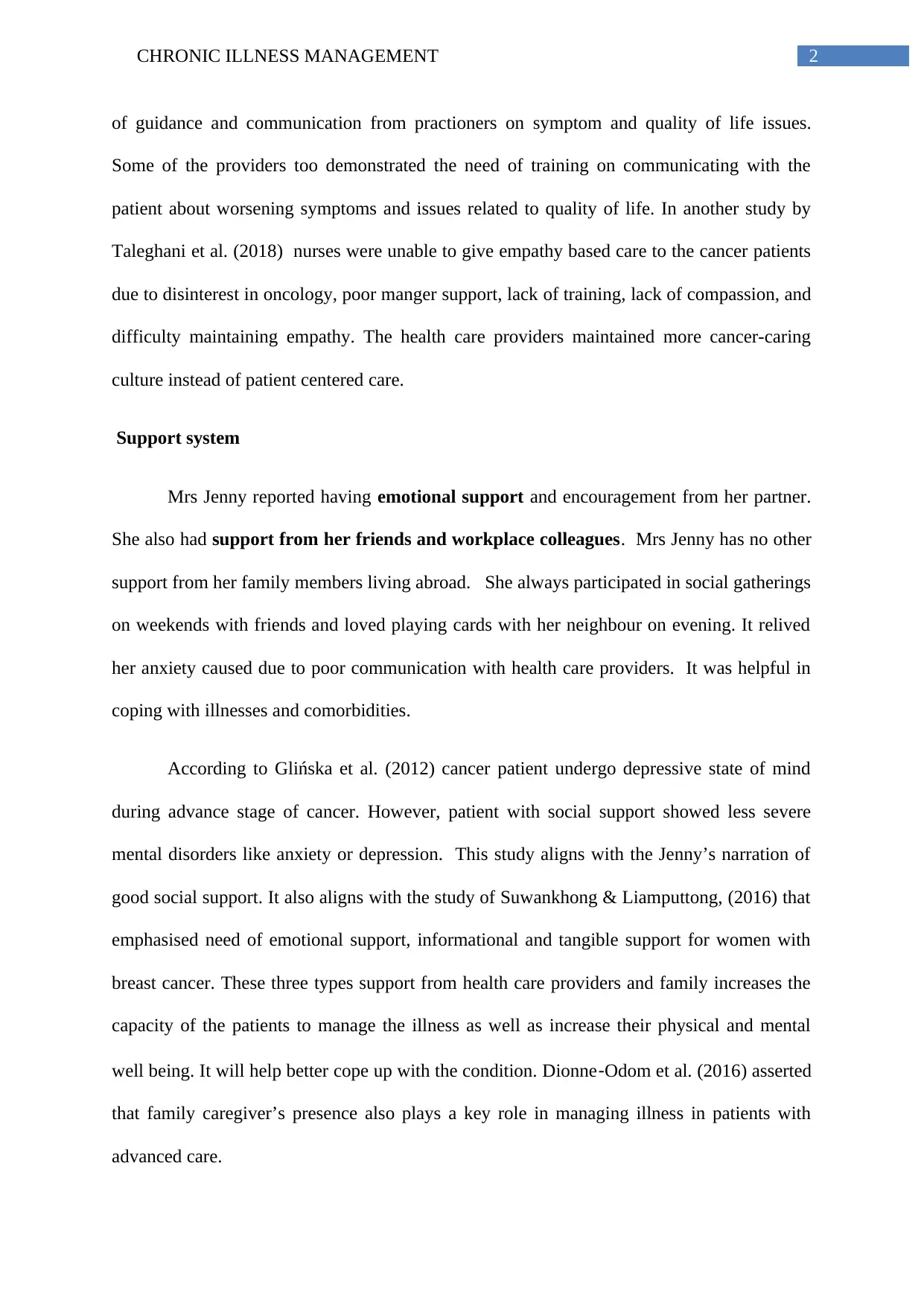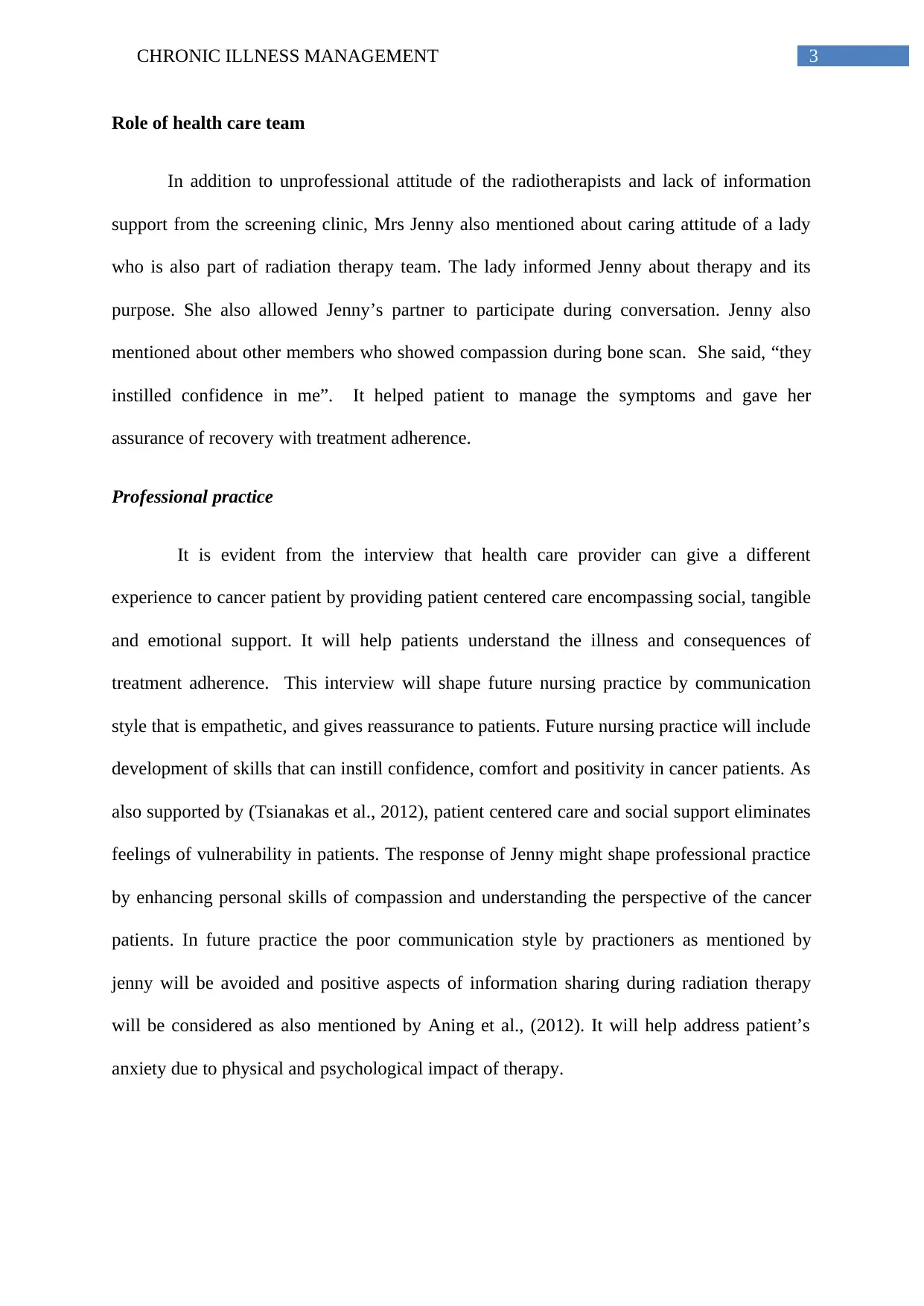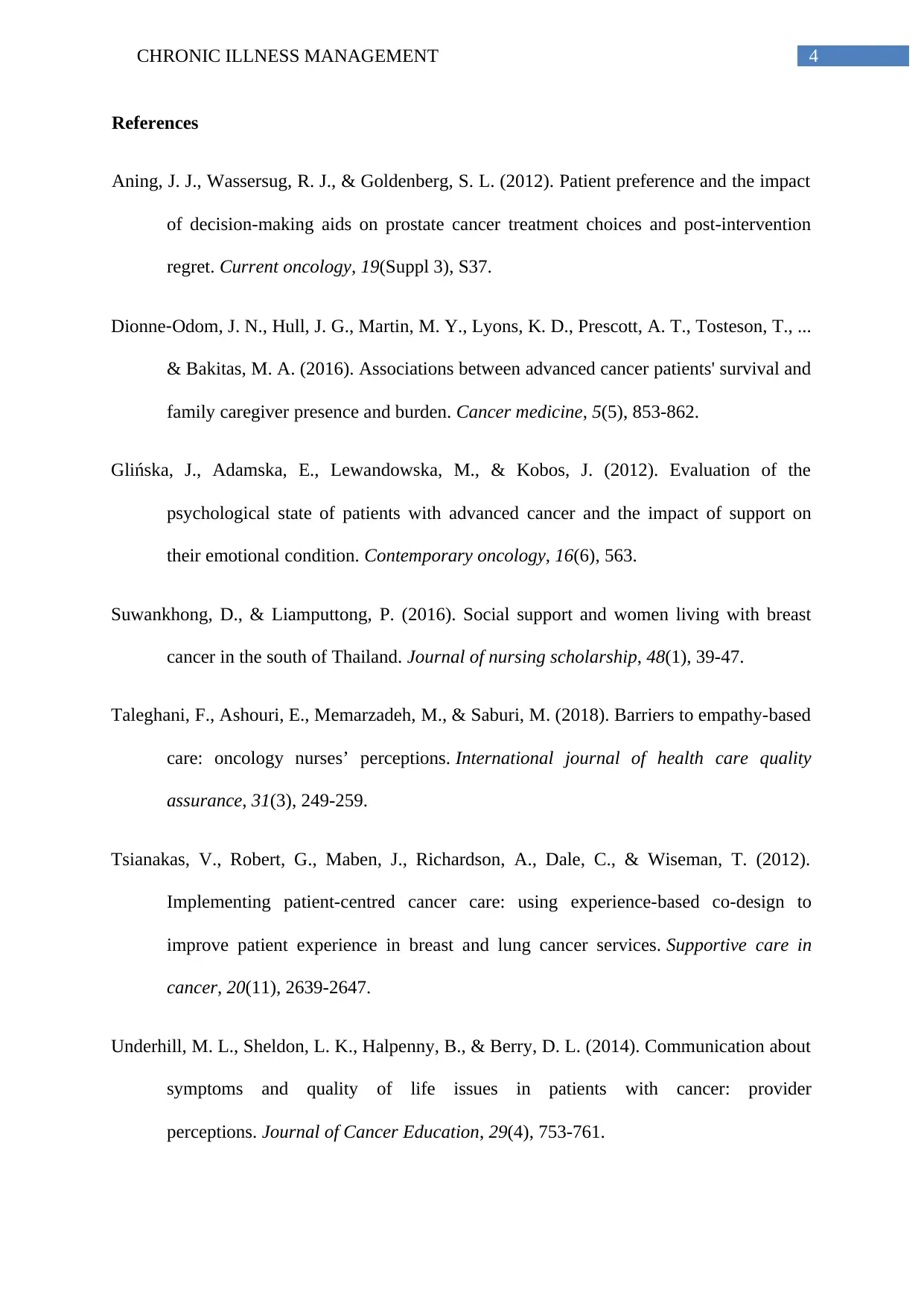Exploring Chronic Illness Management Through a Breast Cancer Case
VerifiedAdded on 2023/06/11
|6
|1371
|192
Case Study
AI Summary
This case study presents an interview with a 65-year-old breast cancer patient, Mrs. Jenny, focusing on the barriers she faced in managing her chronic illness, the support systems available to her, and the role of the healthcare team. Communication issues and a lack of emotional support from healthcare providers were significant barriers, impacting her ability to cope with the illness and treatment side effects. Mrs. Jenny found emotional support from her partner, friends, and colleagues, which helped alleviate her anxiety. The study highlights the importance of patient-centered care, emphasizing the need for healthcare providers to offer social, tangible, and emotional support to improve patients' understanding of their illness and adherence to treatment. The insights gained from this interview can shape future nursing practices by promoting empathetic communication and instilling confidence in cancer patients.

Running head: CHRONIC ILLNESS MANAGEMENT
Chronic illness management
Name of the Student
Name of the University
Author Note
Chronic illness management
Name of the Student
Name of the University
Author Note
Paraphrase This Document
Need a fresh take? Get an instant paraphrase of this document with our AI Paraphraser

1CHRONIC ILLNESS MANAGEMENT
Introduction
The report is the outcome of the personal interview with Mrs Jenny, 65 year old
woman living with breast cancer (name has been changed to maintain confidentiality as per
ethical obligations). The aim of the report is to introduce interviewee details in regards to
illness such as barriers in managing the chronic illness, support available to manage the
illness, length of the time she had lived with illness. Lastly the report presents the role of the
health care team in supporting the patient and helping in illness management.
Barriers
Communication issue was the main barrier according to the interview’s narration.
Mrs Jenny visited the breast screening program and during her fist interaction with the
practioner, she felt let down. She was curious to know about her lump in her breast and other
medical jargons but in vain. She was answered rudely that “the issues was not meant to be
dealt in screening clinic”. She received no clarity on her progress of the disease and
symptoms after being diagnosed with the tumour in the inner lining of breast milk duct. Her
treatment comprised of chemotherapy and radiotherapy as well as breast surgery.
The other barrier faced by Mrs. Jenny is the lack of emotional support from the
health care providers. She said, “My partner was not allowed to accompany me during
treatment as she was female”. One occasion she asked the reason for blood pooling test four
times in period of one year. In another situation, she explained how she felt helpless as he
was ready for radiation on table and the therapists argued from where to start.
The above mentioned issues acted as the barrier in coping with illness and side effects
of treatment. This supports the study by Underhill et al. (2014) on cancer patient’s
perspective. As per the data from the interview, most cancer participants expressed the need
Introduction
The report is the outcome of the personal interview with Mrs Jenny, 65 year old
woman living with breast cancer (name has been changed to maintain confidentiality as per
ethical obligations). The aim of the report is to introduce interviewee details in regards to
illness such as barriers in managing the chronic illness, support available to manage the
illness, length of the time she had lived with illness. Lastly the report presents the role of the
health care team in supporting the patient and helping in illness management.
Barriers
Communication issue was the main barrier according to the interview’s narration.
Mrs Jenny visited the breast screening program and during her fist interaction with the
practioner, she felt let down. She was curious to know about her lump in her breast and other
medical jargons but in vain. She was answered rudely that “the issues was not meant to be
dealt in screening clinic”. She received no clarity on her progress of the disease and
symptoms after being diagnosed with the tumour in the inner lining of breast milk duct. Her
treatment comprised of chemotherapy and radiotherapy as well as breast surgery.
The other barrier faced by Mrs. Jenny is the lack of emotional support from the
health care providers. She said, “My partner was not allowed to accompany me during
treatment as she was female”. One occasion she asked the reason for blood pooling test four
times in period of one year. In another situation, she explained how she felt helpless as he
was ready for radiation on table and the therapists argued from where to start.
The above mentioned issues acted as the barrier in coping with illness and side effects
of treatment. This supports the study by Underhill et al. (2014) on cancer patient’s
perspective. As per the data from the interview, most cancer participants expressed the need

2CHRONIC ILLNESS MANAGEMENT
of guidance and communication from practioners on symptom and quality of life issues.
Some of the providers too demonstrated the need of training on communicating with the
patient about worsening symptoms and issues related to quality of life. In another study by
Taleghani et al. (2018) nurses were unable to give empathy based care to the cancer patients
due to disinterest in oncology, poor manger support, lack of training, lack of compassion, and
difficulty maintaining empathy. The health care providers maintained more cancer-caring
culture instead of patient centered care.
Support system
Mrs Jenny reported having emotional support and encouragement from her partner.
She also had support from her friends and workplace colleagues. Mrs Jenny has no other
support from her family members living abroad. She always participated in social gatherings
on weekends with friends and loved playing cards with her neighbour on evening. It relived
her anxiety caused due to poor communication with health care providers. It was helpful in
coping with illnesses and comorbidities.
According to Glińska et al. (2012) cancer patient undergo depressive state of mind
during advance stage of cancer. However, patient with social support showed less severe
mental disorders like anxiety or depression. This study aligns with the Jenny’s narration of
good social support. It also aligns with the study of Suwankhong & Liamputtong, (2016) that
emphasised need of emotional support, informational and tangible support for women with
breast cancer. These three types support from health care providers and family increases the
capacity of the patients to manage the illness as well as increase their physical and mental
well being. It will help better cope up with the condition. Dionne‐Odom et al. (2016) asserted
that family caregiver’s presence also plays a key role in managing illness in patients with
advanced care.
of guidance and communication from practioners on symptom and quality of life issues.
Some of the providers too demonstrated the need of training on communicating with the
patient about worsening symptoms and issues related to quality of life. In another study by
Taleghani et al. (2018) nurses were unable to give empathy based care to the cancer patients
due to disinterest in oncology, poor manger support, lack of training, lack of compassion, and
difficulty maintaining empathy. The health care providers maintained more cancer-caring
culture instead of patient centered care.
Support system
Mrs Jenny reported having emotional support and encouragement from her partner.
She also had support from her friends and workplace colleagues. Mrs Jenny has no other
support from her family members living abroad. She always participated in social gatherings
on weekends with friends and loved playing cards with her neighbour on evening. It relived
her anxiety caused due to poor communication with health care providers. It was helpful in
coping with illnesses and comorbidities.
According to Glińska et al. (2012) cancer patient undergo depressive state of mind
during advance stage of cancer. However, patient with social support showed less severe
mental disorders like anxiety or depression. This study aligns with the Jenny’s narration of
good social support. It also aligns with the study of Suwankhong & Liamputtong, (2016) that
emphasised need of emotional support, informational and tangible support for women with
breast cancer. These three types support from health care providers and family increases the
capacity of the patients to manage the illness as well as increase their physical and mental
well being. It will help better cope up with the condition. Dionne‐Odom et al. (2016) asserted
that family caregiver’s presence also plays a key role in managing illness in patients with
advanced care.
⊘ This is a preview!⊘
Do you want full access?
Subscribe today to unlock all pages.

Trusted by 1+ million students worldwide

3CHRONIC ILLNESS MANAGEMENT
Role of health care team
In addition to unprofessional attitude of the radiotherapists and lack of information
support from the screening clinic, Mrs Jenny also mentioned about caring attitude of a lady
who is also part of radiation therapy team. The lady informed Jenny about therapy and its
purpose. She also allowed Jenny’s partner to participate during conversation. Jenny also
mentioned about other members who showed compassion during bone scan. She said, “they
instilled confidence in me”. It helped patient to manage the symptoms and gave her
assurance of recovery with treatment adherence.
Professional practice
It is evident from the interview that health care provider can give a different
experience to cancer patient by providing patient centered care encompassing social, tangible
and emotional support. It will help patients understand the illness and consequences of
treatment adherence. This interview will shape future nursing practice by communication
style that is empathetic, and gives reassurance to patients. Future nursing practice will include
development of skills that can instill confidence, comfort and positivity in cancer patients. As
also supported by (Tsianakas et al., 2012), patient centered care and social support eliminates
feelings of vulnerability in patients. The response of Jenny might shape professional practice
by enhancing personal skills of compassion and understanding the perspective of the cancer
patients. In future practice the poor communication style by practioners as mentioned by
jenny will be avoided and positive aspects of information sharing during radiation therapy
will be considered as also mentioned by Aning et al., (2012). It will help address patient’s
anxiety due to physical and psychological impact of therapy.
Role of health care team
In addition to unprofessional attitude of the radiotherapists and lack of information
support from the screening clinic, Mrs Jenny also mentioned about caring attitude of a lady
who is also part of radiation therapy team. The lady informed Jenny about therapy and its
purpose. She also allowed Jenny’s partner to participate during conversation. Jenny also
mentioned about other members who showed compassion during bone scan. She said, “they
instilled confidence in me”. It helped patient to manage the symptoms and gave her
assurance of recovery with treatment adherence.
Professional practice
It is evident from the interview that health care provider can give a different
experience to cancer patient by providing patient centered care encompassing social, tangible
and emotional support. It will help patients understand the illness and consequences of
treatment adherence. This interview will shape future nursing practice by communication
style that is empathetic, and gives reassurance to patients. Future nursing practice will include
development of skills that can instill confidence, comfort and positivity in cancer patients. As
also supported by (Tsianakas et al., 2012), patient centered care and social support eliminates
feelings of vulnerability in patients. The response of Jenny might shape professional practice
by enhancing personal skills of compassion and understanding the perspective of the cancer
patients. In future practice the poor communication style by practioners as mentioned by
jenny will be avoided and positive aspects of information sharing during radiation therapy
will be considered as also mentioned by Aning et al., (2012). It will help address patient’s
anxiety due to physical and psychological impact of therapy.
Paraphrase This Document
Need a fresh take? Get an instant paraphrase of this document with our AI Paraphraser

4CHRONIC ILLNESS MANAGEMENT
References
Aning, J. J., Wassersug, R. J., & Goldenberg, S. L. (2012). Patient preference and the impact
of decision-making aids on prostate cancer treatment choices and post-intervention
regret. Current oncology, 19(Suppl 3), S37.
Dionne‐Odom, J. N., Hull, J. G., Martin, M. Y., Lyons, K. D., Prescott, A. T., Tosteson, T., ...
& Bakitas, M. A. (2016). Associations between advanced cancer patients' survival and
family caregiver presence and burden. Cancer medicine, 5(5), 853-862.
Glińska, J., Adamska, E., Lewandowska, M., & Kobos, J. (2012). Evaluation of the
psychological state of patients with advanced cancer and the impact of support on
their emotional condition. Contemporary oncology, 16(6), 563.
Suwankhong, D., & Liamputtong, P. (2016). Social support and women living with breast
cancer in the south of Thailand. Journal of nursing scholarship, 48(1), 39-47.
Taleghani, F., Ashouri, E., Memarzadeh, M., & Saburi, M. (2018). Barriers to empathy-based
care: oncology nurses’ perceptions. International journal of health care quality
assurance, 31(3), 249-259.
Tsianakas, V., Robert, G., Maben, J., Richardson, A., Dale, C., & Wiseman, T. (2012).
Implementing patient-centred cancer care: using experience-based co-design to
improve patient experience in breast and lung cancer services. Supportive care in
cancer, 20(11), 2639-2647.
Underhill, M. L., Sheldon, L. K., Halpenny, B., & Berry, D. L. (2014). Communication about
symptoms and quality of life issues in patients with cancer: provider
perceptions. Journal of Cancer Education, 29(4), 753-761.
References
Aning, J. J., Wassersug, R. J., & Goldenberg, S. L. (2012). Patient preference and the impact
of decision-making aids on prostate cancer treatment choices and post-intervention
regret. Current oncology, 19(Suppl 3), S37.
Dionne‐Odom, J. N., Hull, J. G., Martin, M. Y., Lyons, K. D., Prescott, A. T., Tosteson, T., ...
& Bakitas, M. A. (2016). Associations between advanced cancer patients' survival and
family caregiver presence and burden. Cancer medicine, 5(5), 853-862.
Glińska, J., Adamska, E., Lewandowska, M., & Kobos, J. (2012). Evaluation of the
psychological state of patients with advanced cancer and the impact of support on
their emotional condition. Contemporary oncology, 16(6), 563.
Suwankhong, D., & Liamputtong, P. (2016). Social support and women living with breast
cancer in the south of Thailand. Journal of nursing scholarship, 48(1), 39-47.
Taleghani, F., Ashouri, E., Memarzadeh, M., & Saburi, M. (2018). Barriers to empathy-based
care: oncology nurses’ perceptions. International journal of health care quality
assurance, 31(3), 249-259.
Tsianakas, V., Robert, G., Maben, J., Richardson, A., Dale, C., & Wiseman, T. (2012).
Implementing patient-centred cancer care: using experience-based co-design to
improve patient experience in breast and lung cancer services. Supportive care in
cancer, 20(11), 2639-2647.
Underhill, M. L., Sheldon, L. K., Halpenny, B., & Berry, D. L. (2014). Communication about
symptoms and quality of life issues in patients with cancer: provider
perceptions. Journal of Cancer Education, 29(4), 753-761.

5CHRONIC ILLNESS MANAGEMENT
⊘ This is a preview!⊘
Do you want full access?
Subscribe today to unlock all pages.

Trusted by 1+ million students worldwide
1 out of 6
Related Documents
Your All-in-One AI-Powered Toolkit for Academic Success.
+13062052269
info@desklib.com
Available 24*7 on WhatsApp / Email
![[object Object]](/_next/static/media/star-bottom.7253800d.svg)
Unlock your academic potential
Copyright © 2020–2026 A2Z Services. All Rights Reserved. Developed and managed by ZUCOL.





